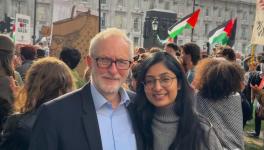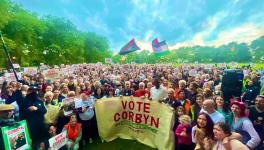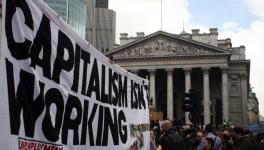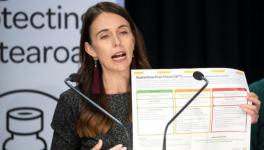The Poverty of Brexit
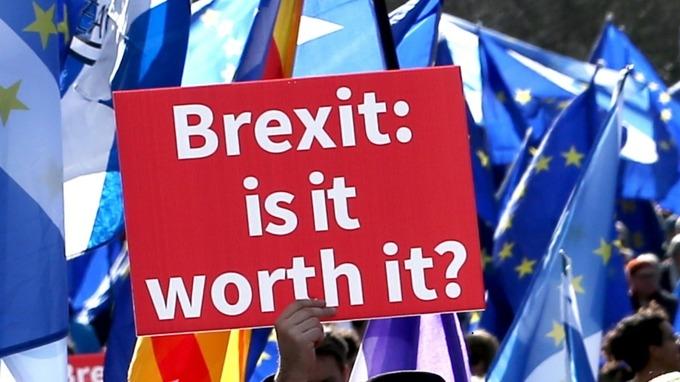
All eyes are on 10, Downing Street, the office of the British Prime Minister. The current resident – Theresa May – might be evicted very soon. She is under immense pressure from her own cabinet, from the parliamentarians of her own Conservative Party and from the grouchy members of the Democratic Unionist Party (DUP). No-one likes her deal, not those who want a complete British exit from the European Union (hence the term Brexit), nor those who do not wish to leave the European Union. The country – in sum – is against Theresa May.
The lead detractor from her own Conservative Party – Jacob Rees-Mogg – has been described as the ‘Honourable Member from the 18th century’. Rees-Mogg is from amongst that set of men who sat in their English estates and sent off working-class Englishmen to shoot people in the colonies and in the battlefields of Europe, and die there. He would like the United Kingdom to break completely with Europe and set its own course backwards into the British Empire.
Ireland, as usual, proves an intractable problem for the British government. May’s majority in parliament is reliant upon the ten members of the DUP, who represent the most conservative sections of the north of Ireland whose identity is wrapped up with the United Kingdom. Currently, there is no border between the Republic of Ireland and the United Kingdom since both are part of the European Union. If the UK exits from the European Union, a border would have to either be re-built across that island or the Irish Sea would become the de facto new border between Europe and the UK – leaving Northern Ireland outside the formal territory of the UK. This is unthinkable for the DUP, which sees this manoeuvre as essentially the absorption of Northern Ireland into the Republic of Ireland.
There is no easy exit. May knows this. So do her Conservative Party colleagues, which is why no one is eager to wear her shoes. It is as clear that the Labour Party, led by Jeremy Corbyn, would not like to handle this nest of vipers. They have a clear social democratic agenda that they would like to enact and would not like their turn in office to be defined by this Conservative Party fiasco.
Poverty is a Political Choice.
A few weeks ago, I was in Liverpool at The World Transformed, a conference that runs parallel to the Labour Party conference. Liverpool, home of The Beatles, should be better known as Britain’s gateway to both the enslavement of Africans and to the colonisation of large parts of the world – including India. It is through ports such as Liverpool that the $45 trillion was siphoned off from India into Britain over the course of its colonial rule (as calculated by Professor Utsa Patnaik).
One evening, I walked in the cold rain from an event on global debt towards my hotel. Needing to use the bathroom, I ducked into a McDonald’s restaurant. A party seemed to be on in the restaurant as the workers cleaned up to close down and as they handed out soft-serve ice-cream to some indigent customers. The manager asked me if I wanted one. ‘It’ll go to waste’, she said in a thick accent which took me a while to understand. I stayed and chatted with the people there.
The workers seemed universally for Jeremy Corbyn and the Labour Party, with one of them wearing a Corbyn pin on her shirt. It was quite clear that they did not see the indigent as a bother, but as people of their own class. They were familiar with each other, which suggested that this evening generosity was a regular affair. Long hours, terrible working-conditions and poor wages define the life of a McDonald’s employee – even that of the ‘manager’. Their solidarity was plainly with the poor rather than with their employers.
To the regulars at this McDonald’s in Liverpool, nothing in Philip Alston’s report on poverty in the UK would come as a surprise. Alston, the UN Special Rapporteur on extreme poverty and human rights shows that 14 million people – a fifth of the population – live in poverty, that child poverty rates are as high as 40% and that the Government lives ‘in a state of denial’. This data is chilling.
But it repeats what is easy to observe, writes Alston, ‘to anyone who opens their eyes to see the immense growth in foodbanks and the queues waiting outside them, the people sleeping rough in the streets, the growth of homelessness, the sense of deep despair that leads even the Government to appoint a Minister for suicide prevention and civil society to report in depth on unheard of levels of loneliness and isolation’.
It has become commonplace to blame poverty on culture or on economics – to suggest that it has something to do with the maladies in cultural or economic behaviour. Some people are motivated to succeed, while others fail. But – as the sensible literature notes – this is quite erroneous, since ‘success’ is often based on where one is born (into wealth and into privilege) and what skills one has that are prized at present (a good carpenter would have been valued in another epoch, but not now).
Quite firmly, Alston writes, ‘poverty is a political choice’. It cannot be reduced to culture or economics. It has to do with policies developed by governments in a context constrained by pressure from big business and banks – neither of whom are keen to allow governments the policy space to expand poverty alleviation programmes. Nowadays big business and banks suggest that poverty can be tackled by ‘incentivisation’ and ‘entrepreneurialism’, by forcing the poor – including the disabled – to seek out jobs that are simply not available. No ‘hand outs’ to the poor, is the mantra, while big business and banks are first in the queue for government subsidies and aid. Not only is poverty a political choice, but so too is the creation of obscene wealth for the ‘ultra-high net worth individuals’.
Brexit.
Alston takes no position on Brexit. But he sees that the turmoil will exacerbate poverty in the British Isles.
May’s government, floundering around Brexit, took sharp aim at Alston’s report. The secretary for work and pensions – Esther McVey – had just resigned in protest at May’s Brexit proposal. Her replacement – Amber Rudd – took to the floor of the House of Commons to attack the ‘extraordinary political nature’ of Alston’s report. It is true. Alston’s report is political because he has correctly identified the political nature of poverty’s rise.
Poverty and economic insecurity in Britain have been caused by the neo-liberal policy agenda pushed by the Conservative Party and by large sections of the Labour Party as well as by the profit-seeking values of big business and banks. Brexit emerged as a convenient way to blame others for increased economic insecurity in the country. Eastern European workers and asylum seekers bore the brunt of the hatred and disregard as did the bureaucrats in Brussels whose regulations are hated by big business and the banks.
The political class – led by the Conservative Party – knows that clarity around the class warfare driven by the ‘ultra-high net worth individuals’ is far too dangerous to allow. Much easier to blame Brussels and an asylum seeker. That’s the Brexit dynamic that tied Britain up into knots.
Get the latest reports & analysis with people's perspective on Protests, movements & deep analytical videos, discussions of the current affairs in your Telegram app. Subscribe to NewsClick's Telegram channel & get Real-Time updates on stories, as they get published on our website.









